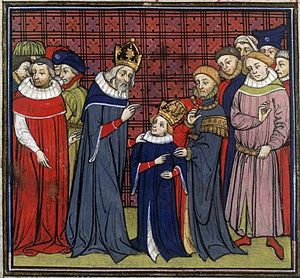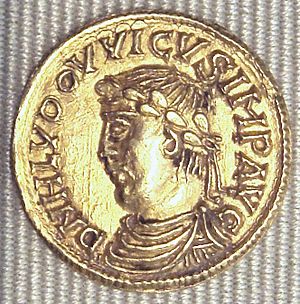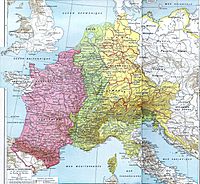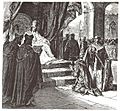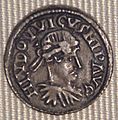Louis the Pious facts for kids
Quick facts for kids Louis the Pious |
|
|---|---|
| Emperor of the Romans | |
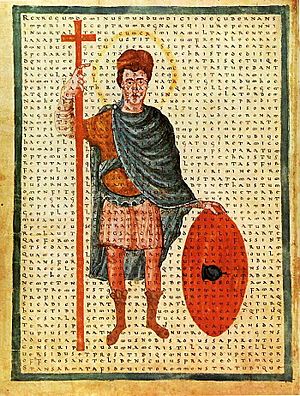
Louis the Pious, contemporary depiction from 826 as a miles Christi (soldier of Christ), with a poem of Rabanus Maurus overlaid. Vatican, Biblioteca Apostolica, Codex Reg. lat 124, f.4v
|
|
| Emperor of the Carolingian Empire | |
| Reign | 813–840 |
| Coronation | 11 September 813 5 October 816 |
| Predecessor | Charlemagne |
| Successor | Lothair I |
| King of the Franks | |
| Reign | 814–840 |
| Predecessor | Charlemagne (Charles I) |
| Successor |
|
| King of Aquitaine | |
| Reign | 781–814 |
| Predecessor | Charlemagne as King of the Franks |
| Successor | Pepin I |
| Born | 16 April 778 Cassinogilum |
| Died | 20 June 840 (aged 62) Ingelheim |
| Burial | Abbey of Saint-Arnould |
| Spouse | Ermengarde of Hesbaye Judith of Bavaria |
| Issue | |
| House | Carolingian |
| Father | Charlemagne |
| Mother | Hildegarde |
| Religion | Chalcedonian Christianity |
Louis the Pious (born April 16, 778 – died June 20, 840) was also known as the Fair. He was the King of the Franks and co-emperor with his father, Charlemagne, starting in 813. He also ruled as King of Aquitaine from 781.
Louis was Charlemagne's only surviving son. This meant he became the sole ruler of the Frankish Empire after his father died in 814. He held this important position until his own death, except for a short time from 833 to 834 when he was removed from power.
During his time as King of Aquitaine, Louis was in charge of protecting the empire's southwestern border. He successfully captured Barcelona from the Emirate of Córdoba in 801. He also made sure that Frankish rule was strong in Pamplona and among the Basques south of the Pyrenees mountains by 812. As emperor, Louis wanted to share power with his adult sons, Lothair, Pepin, and Louis the German. He tried to divide the empire fairly among them.
The first ten years of his reign had some difficult moments. One notable event was his public act of penance for the death of his nephew, Bernard of Italy. In the 830s, his empire faced civil wars. These wars were caused by his sons fighting over who would inherit parts of the empire. This problem got worse when Louis tried to include his youngest son, Charles the Bald, in his plans for succession. Even though his reign ended with some order restored, three more years of civil war followed his death.
Contents
Louis's Early Life and Rule in Aquitaine
Louis was born in 778 while his father, Charlemagne, was on a military trip in Spain. He was born at a royal country house called Cassinogilum, which is believed to be near Poitiers. Louis was the third son of Charlemagne and his wife, Hildegard. He had a twin brother, Lothair, who died when he was very young. Louis and Lothair were given names from an older royal family, the Merovingian dynasty. This was possibly to show a connection to that ancient line of kings.
Louis became King of Aquitaine when he was just three years old in 781. The next year, he was sent to Aquitaine with advisors to help him rule. Charlemagne created this smaller kingdom to protect the empire's border. This was especially important after difficult wars against the Aquitanians and Basques. Charlemagne wanted Louis to grow up in the region he would rule.
In 794, Charlemagne gave Louis four former Roman villas to use as winter homes. Charlemagne wanted all his sons to grow up like natives of their assigned lands. They were to wear local clothes and rule according to local customs. These border areas, called "marches," were very important. They acted as strong defenses against threats to the empire. Louis ruled over the Spanish March. In 797, Barcelona, a major city in this region, was taken by the Franks. Louis led his army, including soldiers from different regions, to besiege Barcelona for seven months. The city finally surrendered in 801.
Louis was one of Charlemagne's three sons who lived past infancy. His brothers, Charles the Younger and Pepin, were also expected to inherit parts of the empire. However, both Pepin and Charles died before their father. Because of this, Louis was crowned co-emperor with Charlemagne in Aachen on September 11, 813. When his father died in 814, Louis inherited the entire Carolingian Empire.
Becoming Emperor of the Franks
When Louis heard about his father's death, he quickly went to Aachen. There, he crowned himself emperor. His first actions as emperor were to make changes to the palace. He removed people he thought were unsuitable and destroyed old pagan texts and symbols that Charlemagne had collected. He also sent his unmarried half-sisters and nieces to nunneries. This was done to prevent any political problems that might arise from powerful brothers-in-law.
Louis kept some of his father's trusted advisors. He also brought in new ones, like Bernard of Septimania and Ebbo, who became the Archbishop of Reims. Louis also worked with Benedict of Aniane, a religious leader. Benedict helped reform the Frankish church, making sure all religious houses followed the Rule of Saint Benedict. Louis's coins looked like his father's, showing his imperial power. In 816, Pope Stephen IV visited Reims and crowned Louis again. This event set a tradition for many future French kings to be crowned in Reims.
Dividing the Empire: The Ordinatio Imperii
On April 9, 817, a wooden walkway at the palace in Aachen collapsed. Many people died, and Louis barely survived. Feeling that death was near, Louis began to plan for who would rule after him. Three months later, with the approval of his court and church leaders, he issued a decree. This decree, called the Ordinatio Imperii, set out a plan for how his sons would inherit the empire.
In 815, Louis had already given his two oldest sons, Lothair and Pepin, roles in the government. He sent them to govern Bavaria and Aquitaine, respectively. Now, he officially divided the empire among his three sons:
- Lothair was crowned co-emperor. He was promised most of the Frankish lands and would be the main ruler over his brothers.
- Pepin was made King of Aquitaine, which included areas like Gascony and Toulouse.
- Louis the German, the youngest son, became King of Bavaria and nearby regions.
The plan stated that if a king died, his sons would take over. If he died without children, Lothair would inherit his kingdom. The most important rule was that the Empire would stay united. The Emperor would rule over the other kings, and they had to obey him. This plan aimed to keep the empire together while giving each son a position. However, it did not include Louis's nephew, Bernard, which led to problems.
Bernard's Rebellion and Louis's Penance
Bernard, who was King of Italy, felt left out by the Ordinatio Imperii. He started to plan for independence. When Louis heard about this, he quickly moved his army towards Italy. Bernard met his uncle and surrendered. Louis had him tried and sentenced to death for treason. The sentence was changed to blinding, but Bernard died two days later. This event deeply affected Louis.
In 822, Louis, being a very religious man, performed a public act of penance. This happened at his palace in Attigny. He confessed his sins, including his role in Bernard's death. This act showed his deep regret but also lowered his standing as a ruler. He also released some important people he had exiled earlier, which caused more issues later.
Protecting the Borders: Frontier Wars
At the beginning of Louis's reign, many tribes on the empire's borders were afraid of the Franks. But soon, some groups like the Sorbs and Obotrites rebelled. The Danes also became a big threat, raiding the northern coasts.
In the southeast, Ljudevit, a Slavic duke, caused trouble near the Drava and Sava rivers. Louis sent armies to deal with these threats. In the southwest, Louis had to manage the Lombard princes of Benevento, whom Charlemagne had never fully controlled. Problems also arose in Gascony, leading to changes in leadership there. Louis also planned an expedition against the Cordoban caliphate, but it did not succeed.
First Civil War: Family Conflicts Begin
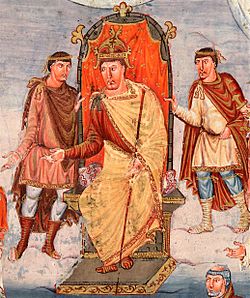
In 818, Louis's wife, Ermengarde, died. Louis was very close to her. After many months, his advisors convinced him to remarry. In 820, he married Judith. In 823, Judith gave birth to a son named Charles.
The birth of Charles caused problems with the earlier division of the empire. Louis wanted to give land to his fourth son, but his older sons strongly resisted. This led to civil wars that lasted for the rest of his reign. In 829, Louis gave Alemannia to Charles. This angered his son Lothair, whose share of the empire was now smaller. An uprising soon began.
In 830, Pepin of Aquitaine led an army towards Paris, supported by other nobles. Louis the German joined him. The emperor returned from a campaign to find his empire at war. He was captured by Pepin's forces. His wife, Judith, was imprisoned, and Bernard fled. Lothair then joined the revolt. However, Louis promised his sons Louis the German and Pepin more land. This made them switch their loyalty back to their father. Lothair was pardoned but sent to Italy.
Second Civil War: The Field of Lies
Another revolt happened just two years later, in 832. Pepin was called to his father's court but left against orders. Louis the German gathered an army and conquered Swabia. Louis the Pious again divided his empire. He declared Charles king of Aquitaine and took away Pepin's lands. He gave the rest of the empire back to Lothair, who was not yet involved in this new war.
Soon, Lothair joined the revolt in 833, supported by Pope Gregory IV. Louis and Lothair's armies met on the plains of the Rothfeld. Much of Louis's army left him, and he told his remaining followers to go, saying it would be a shame if they were harmed for his sake. The emperor was taken prisoner. This event was so shameful that the place became known as the "Field of Lies."
On November 13, 833, Louis performed public penance for the second time. He confessed to various crimes, including breaking oaths and not being able to control his wife. He was meant to live the rest of his life as a penitent, never holding office again. However, this humiliation turned many loyal nobles against Lothair. Louis was restored to power on March 1, 834.
In 836, the family made peace. Louis gave Pepin and Louis their lands back. He took almost all of Lothair's lands, leaving him only Italy, and gave the rest to Charles. Around this time, the Vikings began to attack and raid northern cities like Utrecht and Antwerp. Louis gathered a large army against them, and they fled. He also ordered the building of a North Sea fleet to protect the coasts.
Third Civil War: The Final Conflict
In 837, Louis crowned Charles king over Alemannia and Burgundy. He also gave Charles a part of his brother Louis the German's land. Louis the German immediately rebelled. The emperor again divided his realm, giving almost all of Louis the German's lands (except Bavaria) to Charles. When Pepin died in 838, Louis declared Charles the new king of Aquitaine. However, the nobles chose Pepin's son, Pepin II, as their king. When Louis threatened to invade, the third major civil war of his reign began.
In the spring of 839, Louis the German invaded Swabia. Pepin II and his Gascon subjects fought their way to the Loire River. The Danes also returned to raid the Frisian coast. Lothair, for the first time in a long while, allied with his father. He pledged support in exchange for a new division of the inheritance. Louis gave Bavaria to Louis the German and disinherited Pepin II. The rest of the empire was divided into an eastern and a western part. Lothair chose the eastern part, including Italy, leaving the western part for Charles. Louis quickly brought Aquitaine under control. He then forced the younger Louis into the Ostmark region. The empire was now settled as he had declared. Louis returned to Frankfurt am Main and disbanded his army. The final civil war of his reign was over.
Louis's Death and Legacy
Louis became ill soon after his last successful campaigns. He went to his summer hunting lodge on an island in the Rhine River. He died on June 20, 840. He was with many bishops and clerics and in the arms of his half-brother Drogo. He pardoned his son Louis, declared Lothair emperor, and asked him to protect Charles and Judith.
Soon after Louis's death, his surviving sons plunged into another civil war. This war lasted until 843, ending with the signing of the Treaty of Verdun. This treaty divided the empire into three separate kingdoms. West Francia and East Francia became the beginnings of modern France and Germany. Middle Francia, which included Burgundy, the Low Countries, and northern Italy, lasted only a short time. It was later reorganized as Lotharingia. The fight over who would be king of Aquitaine was not fully settled until 860.
Louis was buried in the Abbey of Saint-Arnould in Metz.
Louis's Family
Louis had children with two wives and an unknown concubine.
With his first wife, Ermengarde of Hesbaye (married around 794), he had three sons and three daughters:
- Lothair (795–855), who became king of Middle Francia.
- Pepin (797–838), who became king of Aquitaine.
- Adelaide (born around 799).
- Rotrude (born 800).
- Hildegard (or Matilda) (born around 802).
- Louis the German (around 806 – 876), who became king of East Francia.
With his second wife, Judith of Bavaria, he had a daughter and a son:
- Gisela, who married Eberhard of Friuli.
- Charles the Bald, who became king of West Francia.
By an unknown concubine, he had two children:
- Arnulf of Sens
- Alpais
Images for kids
-
A Denarius coin from the time of Louis the Pious.
See also
 In Spanish: Ludovico Pío para niños
In Spanish: Ludovico Pío para niños
 | Delilah Pierce |
 | Gordon Parks |
 | Augusta Savage |
 | Charles Ethan Porter |


